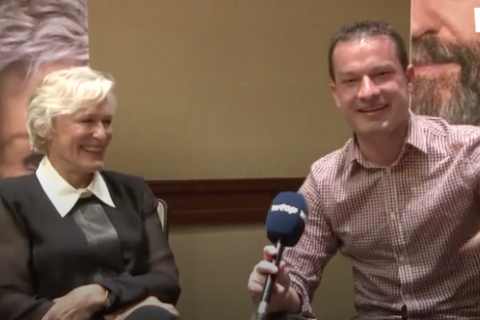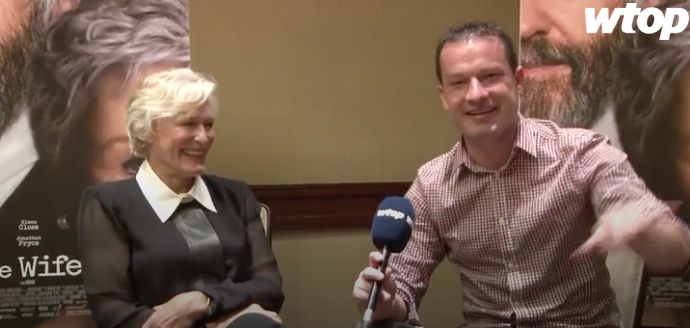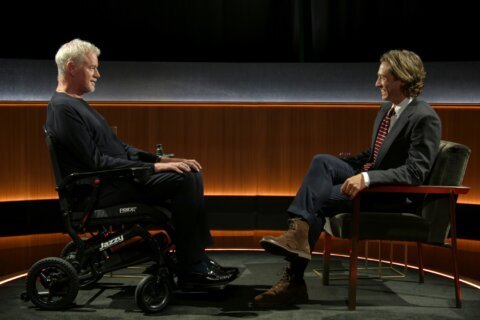WASHINGTON — At long last, Glenn Close’s overdue Academy Award won’t be ignored.

It’s unbelievable to think that her contemporary Meryl Streep has won three Oscars while Close has time and again only come close. Surely she deserved at least one for “The World According to Garp” (1982), “The Big Chill” (1983), “The Natural” (1984), “Fatal Attraction” (1987), “Dangerous Liaisons” (1988) or Cruella de Vil in Disney’s live-action “101 Dalmatians” (1996).
So it was with immense joy to watch her work unfold in “The Wife,” a powerful human story with complex emotions, narrative twists and timely themes for the #MeToo era. It’s a perfect storm that, at this time, in this place, should finally bring Close her belated Academy Award.
“We could not find one American actor of stature who would be in a movie called ‘The Wife’ — it took a Brit,” Close told WTOP. “[Screenwriter] Jane Anderson adapted the book 14 years ago. The fact that it took such a long time to get this movie made is a statement in itself.”
Based on Meg Wolitzer’s novel, the film follows Joan Castleman (Glenn Close) who questions her life choices as she joins her husband Joe (Jonathan Pryce) on a “Wild Strawberries” style trip to Stockholm, where he is to receive the Nobel Prize for Literature. Along the way, she is hounded by biographer Nathaniel Bone (Christian Slater), who uncovers secrets of their past.
“That was always in the script, that there was something a little off, odd and Andy Warhol about him,” Slater told WTOP. “Just a quirky guy who gets in your face and is annoying and irritating. … You get a hold of a bone and you don’t want to let it go. … If he gets a glimpse or any shred of evidence that there is some secret to be uncovered, he won’t let it go.”
As the script unravels and the truth is revealed, the family dynamics are thrown into chaos.
“It was very cleverly written, so you follow that map,” director Björn Runge told WTOP. “The script I thought was beautiful. I understand it, I understand the universe of it, so it was easy to get touched by what’s happening through that journey. … It was a love affair to read it.”
Not only does the script offer juicy plot twists, it features beautiful, full-circle echoes between the past and present. At one point, Close and Pryce excitedly jump on the bed, followed by flashbacks of their younger selves (Annie Starke and Harry Lloyd) also jumping on a bed.
“When they are younger, they are looking forward to what will come,” Runge said. “They’re creating a life, creating a family, creating a work and career, so it’s people with a direction into the future. But now when we see them as a major couple, they’re reflecting over a life that has been. So, it’s two different forces and I like that they can be mirrored into each other.”
Beyond any narrative devices, the script shines most in its ability to give authentic complexity to its characters. The married couple pivots on a dime between love and hate, having a five-alarm hotel argument, then immediately hugging at the news of becoming grandparents.
“That’s one of the things that I really loved about the script,” Close said. “It’s real life. They’ve been together for a long time. Even though there are these very serious undercurrents and they’ve had a very serious argument, the fact that they’re grandparents for the first time is very exciting. … I love when we have the big fight at the end, then at one point I say, ‘I just want to get out of this dress,’ and he helps me unzip it! … We’re very complex creatures.”
The complexity stems from Joan’s frustrations at Joe taking her contributions for granted.
“There’s a moment when something almost cracks inside of her,” Close said. “It’s unbearable. She can’t be in the room. She can’t be a part of it anymore.”
It’s as powerful a zeitgeist moment as you’ll see this year, a feat no filmmaker can predict.
“You never know,” Runge said. “We shot it in 2016 in the autumn. #MeToo wasn’t there. Suddenly, the last autumn of 2017, the #MeToo was there. Now, we also have the crisis in the Nobel Academy in Sweden. They won’t give any Nobel Prizes this year to any writers. So you never know where the film will land, but hopefully it will connect in ways that you can’t imagine. So for me, I think it connects very much to the time we are living in now.”
Yes, it’s an era where the contributions of women can no longer be ignored, a full-circle evolution from Close’s iconic “Fatal Attraction” villain who was “not going to be ignored.” Today, Close’s Alex Forrest remains the American Film Institute’s No. 7 Villain of All Time.
“I found out I was pregnant during the reshoots when I was doing all that stuff in the bathtub!” Close said. “You can’t imagine the amount of men who came up to me and said, ‘You scared the sh*t out of me,’ and the women who said, ‘You saved my marriage!'”
“All of a sudden, monogamy was very popular,” Slater joked.
Here’s hoping “The Wife” will save a few marriages on the road to Close’s culminating Oscar.










